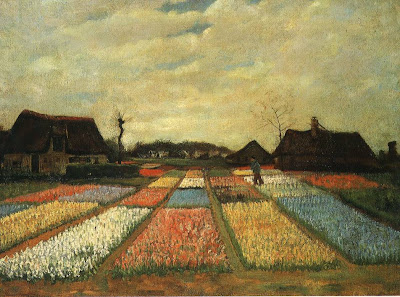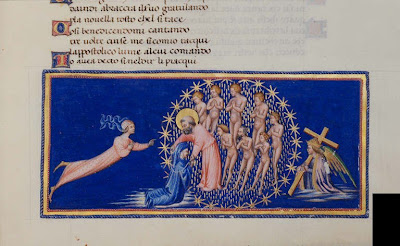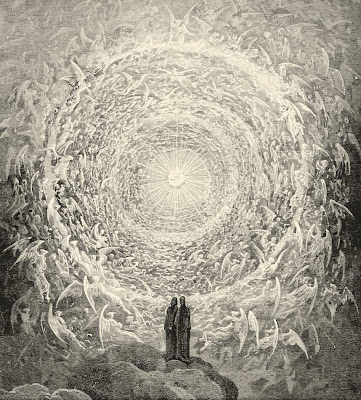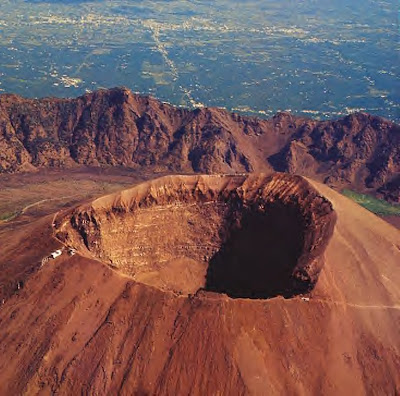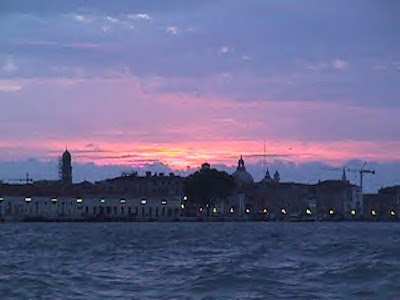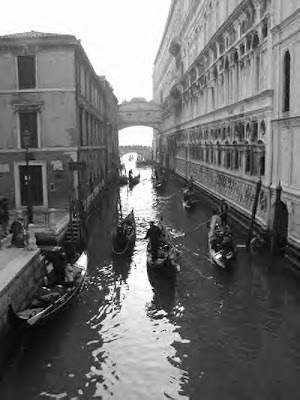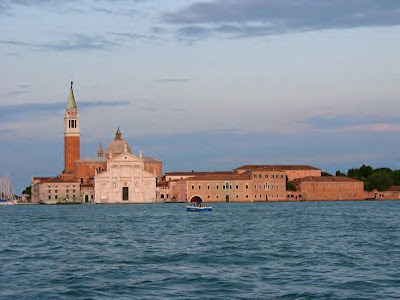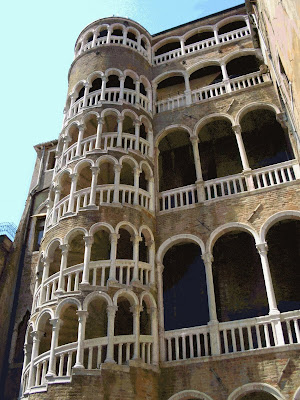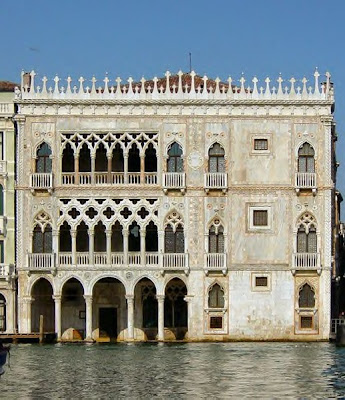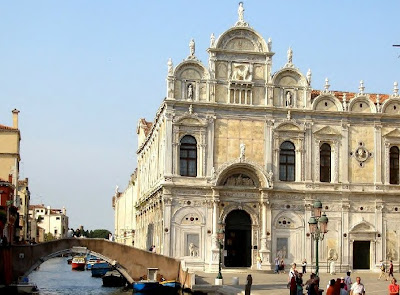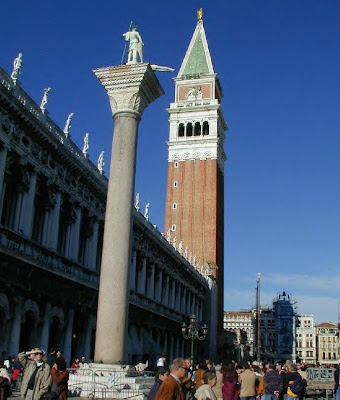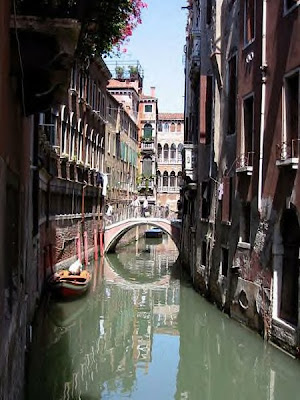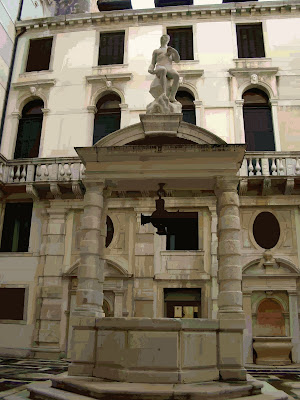.
The
Inferno begins with 'three blessed ladies' - the Mother of God, St Lucy, and Beatrice - coming to the rescue of the poet who has lost his way in the dark wood of worldliness. All that he sees thereafter is intended by God to lead him back to the path of holiness.
For the character who is the Dante in the
Divine Comedy, the intention is to reach the celestial rose, to share the gladness and glory of the Queen of Heaven and all the angels and saints in the immediate vision of the Most Holy Trinity.
The character of Dante in the
Divine Comedy must discover or re-discover the true path from which he has become lost: to fear Hell, to be ready for Purgatory, and to walk humbly, on the path of faith, hope, and charity, towards Paradise, the snow-white rose, the shining city of the saints, whose only lamp is the glorified Lamb.
Dante Alighieri (born at Florence, 1265; died at Ravenna, Italy, 14 September, 1321) in his
Divine Comedy sums up the knowledge and intellectual attainment of the centuries that passed between the fall of the Roman Empire and the beginning of the Renaissance. It gives a complete picture of Catholicism in the thirteenth century in Italy.
Dante's vehement denunciation of the ecclesiastical corruption of his times, and his condemnation of most of the contemporary popes (including Boniface VIII, and the canonized Celestine V) to Hell have led to some questioning as to the poet's attitude towards the Church. Even in the fourteenth century attempts were made to find heresy in the
Divine Comedy. The
De Monarchiâ was burned at Bologna by order of a papal legate.
It was not longer after his death that there was critical recognition of the genius of Dante and his works, especially the
Comedy. His reputation has never really fallen into desuetude. The first commentaries on the
Comedy appeared within 10 years of his death.
The Divine Comedy and his other works have been a source of inspiration for literature, art and music throughout the centuries. The effect was international.
The power of the sacred poem in popularizing Catholic theology and Catholic philosophy, and rendering it acceptable, or at least intelligible to non-Catholics, is almost incalculable.
In 1881, Pope Leo XIII removed the
De Monarchia from the official list of books banned by the Roman Catholic Church. It had been on the list since 1554.
Benedict XV, honoured him with an encyclical on the sixth centenary of his death. At Rome at St. Peter's, on April 30, 1921, Benedict XV issued the encyclical
In Praeclara Summorum. It is worth quoting it in full:
"TO PROFESSORS AND STUDENTS OF LITERATURE
AND LEARNING IN THE CATHOLIC WORLD.
Beloved Children,
Health and the Apostolic Benediction.
1. Among the many celebrated geniuses of whom the Catholic faith can boast who have left undying fruits in literature and art especially, besides other fields of learning, and to whom civilization and religion are ever in debt, highest stands the name of Dante Alighieri, the sixth centenary of whose death will soon be recorded. Never perhaps has his supreme position been recognized as it is today. Not only Italy, justly proud of having given him birth, but all the civil nations are preparing with special committees of learned men to celebrate his memory that the whole world may pay honour to that noble figure, pride and glory of humanity.
2. And surely we cannot be absent from this universal consensus of good men; rather should We take the lead in it as the Church has special right to call Alighieri hers.
3. So, just as at the beginning of Our Pontificate by a Letter to the Archbishop of Ravenna We promoted the restoration of the temple where the ashes of the poet lie, so now, to initiate the cycle of the centenary celebrations, it has seemed most opportune to Us to speak to you all, beloved children, who cultivate letters under the maternal vigilance of the Church, to show even more clearly than before the intimate union of Dante with this Chair of Peter, and how the praises showered on that distinguished name necessarily redound in no small measure to the honour of the Catholic Church.
4. And first of all, inasmuch as the divine poet throughout his whole life professed in exemplary manner the Catholic religion, he would surely desire that this solemn commemoration should take place, as indeed will be the case, under the auspices of religion, and if it is carried out in San Francesco in Ravenna it should begin in San Giovanni in Florence to which his thoughts turned during the last years of his life with the desire of being crowned poet at the very font where he had received Baptism. Dante lived in an age which inherited the most glorious fruits of philosophical and theological teaching and thought, and handed them on to the succeeding ages with the imprint of the strict scholastic method. Amid the various currents of thought diffused then too among learned men Dante ranged himself as disciple of that Prince of the school so distinguished for angelic temper of intellect, Saint Thomas Aquinas. From him he gained nearly all his philosophical and theological knowledge, and while he did not neglect any branch of human learning, at the same time he drank deeply at the founts of Sacred Scripture and the Fathers. Thus he learned almost all that could be known in his time, and nourished specially by Christian knowledge, it was on that field of religion he drew when he set himself to treat in verse of things so vast and deep. So that while we admire the greatness and keenness of his genius, we have to recognize, too, the measure in which he drew inspiration from the Divine Faith by means of which he could beautify his immortal poems with all the lights of revealed truths as well as with the splendours of art. Indeed, his Commedia, which deservedly earned the title of Divina, while it uses various symbolic images and records the lives of mortals on earth, has for its true aim the glorification of the justice and providence of God who rules the world through time and all eternity and punishes and rewards the actions of individuals and human society. It is thus that, according to the Divine Revelation, in this poem shines out the majesty of God One and Three, the Redemption of the human race operated by the Word of God made Man, the supreme loving-kindness and charity of Mary, Virgin and Mother, Queen of Heaven, and lastly the glory on high of Angels, Saints and men; then the terrible contrast to this, the pains of the impious in Hell; then the middle world, so to speak, between Heaven and Hell, Purgatory, the Ladder of souls destined after expiation to supreme beatitude. It is indeed marvellous how he was able to weave into all three poems these three dogmas with truly wrought design. If the progress of science showed later that that conception of the world rested on no sure foundation, that the spheres imagined by our ancestors did not exist, that nature, the number and course of the planets and stars, are not indeed as they were then thought to be, still the fundamental principle remained that the universe, whatever be the order that sustains it in its parts, is the work of the creating and preserving sign of Omnipotent God, who moves and governs all, and whose glory
risplende in una parte piu e meno altrove; and though this earth on which we live may not be the centre of the universe as at one time was thought, it was the scene of the original happiness of our first ancestors, witness of their unhappy fall, as too of the Redemption of mankind through the Passion and Death of Jesus Christ. Therefore the divine poet depicted the triple life of souls as he imagined it in a such way as to illuminate with the light of the true doctrine of the faith the condemnation of the impious, the purgation of the good spirits and the eternal happiness of the blessed before the final judgment.
5. But among the truths that shine out in the triple poem of Alighieri as in his other works We think that these things may serve as teaching for men of our times. That Christians should pay highest reverence to the Sacred Scripture and accept what it contains with perfect docility he proclaims when he says that "Though many are the writers of the Divine Word nevertheless there is but one Dictator, God, Who has deigned to show us His goodwill through the pens of many" (Mon. III, 4). Glorious expression of a great truth. Again, when he says that "The Old and the New Testament, prescribed for eternity, as the Prophet says, contain 'spiritual teachings transcending human reason,' given 'by the Holy Ghost who by means of the Prophets and sacred writings, through Jesus Christ coeternal Son of God and through His disciples revealed the supernatural truth necessary for us"' (Mon. III, 3, 16). And therefore regarding the life to come "It is assured by the true doctrine of Christ who is the Way, the Truth and the Life: the Way because by that way we advance without hindrance to the happiness of that immortality; the Truth because He is free from all error; the Light because He enlightens us in the darkness of ignorance of this world" (Conv. II, 9). And no less reverence he pays to "those venerable Great Councils the presence of Christ in which no one of the faithful doubts"; and great is his esteem for "writings of the Doctors, Augustine and the others, and if any one doubt that they were aided by the Holy Ghost either he has not seen their fruits or if he has seen he has not tasted" (Mon. III, 3).
6. No need to recall Alighieri's great reverence for the authority of the Catholic Church, the account in which he holds the power of the Roman Pontiff as the base of every law and institution of that Church. Hence the outspoken warning to Christians: You have the Old and the New Testament: the Pastor of the Church as Guide; Let that suffice for your salvation. He felt the troubles of the Church as his own, and while he deplored and condemned all rebellion against its Supreme Head he wrote as follows to the Italian Cardinals during the stay at Avignon: "To us who confess the same Father and Son, the same God and Man, the same Mother and Virgin; to us for whom and for whose salvation the message was given, after the triple Lovest thou Me? Feed My sacred sheepfold; to us, driven to mourn with Jeremias - but not over things to come but over things that are - for Rome - that Rome on which Christ, after all the old pomp and triumph, confirmed by word and work the empire of the world, and which Peter, too, and Paul the Apostle of the Nations consecrated with their very blood as Apostolic See - now widowed and desolate; to us it is as terrible grief to see this as to see the tragedy of heresy" (Epist. VIII). For him the Roman Church is The Most Holy Mother, Bride of Him Crucified and to Peter, infallible judge of revealed truths, is owing perfect submission in matters of faith and morals. Hence, however much he may hold that the dignity of the Emperor is derived immediately from God, still he asserts that this truth "must not be understood so strictly as to mean that the Roman Prince is not subject to the Roman Pontiff in anything, because this mortal happiness is subjected in certain measure to immortal happiness" (Mon. III, 16). Excellent and wise principle indeed which, if it were observed today as it ought to be, would bring to States abundant fruits of civil prosperity. But, it will be said, he inveighs with terrible bitterness against the Supreme Pontiffs of his times. True; but it was against those who differed from him in politics and he thought were on the side of those who had driven him from his country. One can feel for a man so beaten down by fortune, if with lacerated mind he breaks out sometimes into words of excessive blame, the more so that, to increase his feeling, false statements were being made by his political enemies ready, as always happens, to give an evil interpretation to everything. And indeed, since, through mortal infirmity, "by worldly dust even religious hearts must needs be soiled" (St. Leo M. S. IV de Quadrag), it cannot be denied that at that time there were matters on which the clergy might be reproved, and a mind as devoted to the Church as was that of Dante could not but feel disgust while we know, too, that reproof came also from men of conspicuous holiness. But, however he might inveigh, rightly or wrongly, against ecclesiastical personages, never did he fail in respect due to the Church and reverence for the "Supreme Keys"; and on the political side he laid down as rule for his views "the reverence which a good son should show towards his father, a dutiful son to his mother, to Christ, to the Church, to the Supreme Pastor, to all who profess the Christian religion, for the safeguarding of truth" (Mon. III, 3).
7. Thus, as he based the whole structure of his poem on these sound religious principles, no wonder that we find in it a treasure of Catholic teaching; not only, that is, essence of Christian philosophy and theology, but the compendium of the divine laws which should govern the constitution and administration of States; for Dante Alighieri was not a man to maintain, for the purpose of giving greater glory to country or pleasure to ruler, that the State may neglect justice and right which he knew well to be the main foundation of civil nations.
8. Wonderful, therefore, is the intellectual enjoyment that we gain from the study of the great poet, and no less the profit for the student making more perfect his artistic taste and more keen his zeal for virtue, as long as he keeps his mind free from prejudice and open to accept truth. Indeed, while there is no lack of great Catholic poets who combine the useful with the enjoyable, Dante has the singular merit that while he fascinates the reader with wonderful variety of pictures, with marvellously lifelike colouring, with supreme expression and thought, he draws him also to the love of Christian knowledge, and all know how he said openly that he composed his poem to bring to all "vital nourishment." And we know now too how, through God's grace, even in recent times, many who were far from, though not averse to Jesus Christ, and studied with affection the
Divina Commedia, began by admiring the truths of the Catholic Faith and finished by throwing themselves with enthusiasm into the arms of the Church.
9. What We have said above suffices to show how opportune it is that on the occasion of this world centenary each should intensify his zeal for the preservation of that Faith shown by Dante pre-eminently as support of learning and the arts. For We admire in him not only supreme height of genius but also the immensity of the subject which holy religion put to his hand. If his genius was refined by meditation and long study of the great classics it was tempered even more gloriously, as We have said, by the writings of the Doctors and the Fathers which gave him the wings on which to rise to a higher atmosphere than that of restricted nature. And thus it comes that, though he is separated from us by centuries, he has still the freshness of a poet of our times: certainly more modern than some of those of recent days who have exhumed the Paganism banished forever by Christ's triumph on the Cross. There breathes in Alighieri the piety that we too feel; the Faith has the same meaning for us; it is covered with the same veil, "the truth given to us from on high, by which we are lifted so high." That is his great glory, to be the Christian poet, to have sung with Divine accents those Christian ideals which he so passionately loved in all the splendour of their beauty, feeling them intimately and making them his life. Such as dare to deny to Dante this award and reduce all the religious content of the
Divina Commedia to a vague ideology without basis of truth fail to see the real characteristic of the poet, the foundation of all his other merits.
10. If then Dante owes so great part of his fame and greatness to the Catholic Faith, let that one example, to say nothing of others, suffice to show the falseness of the assertion that obedience of mind and heart to God is a hindrance to genius, whereas indeed it incites and elevates it. Let it show also the harm done to the cause of learning and civilization by such as desire to banish all idea of religion from public instruction. Deplorable indeed is the system prevalent today of educating young students as if God did not exist and without the least reference to the supernatural. In some places the "sacred poem" is not kept outside the schools, is indeed numbered among the books to be studied specially; but it does not bring to the young students that "vital nourishment" which it should do because through the principle of the "lay school" they are not disposed towards the truths of the Faith as they should be. Heaven grant that this may be the fruit of the Dante Centenary: that wherever literary instruction is given the great poet may be held in due honour and that he himself may be for the pupils the teacher of Christian doctrine, he whose one purpose in his poem was "to raise mortals from the state of misery," that is from the state of sin, "and lead them to the state of happiness," that is of divine grace (Epist. III, para. 15).
11. And you, beloved children, whose lot it is to promote learning under the
magisterium of the Church, continue as you are doing to love and tend the noble poet whom We do not hesitate to call the most eloquent singer of the Christian idea. The more profit you draw from study of him the higher will be your culture, irradiated by the splendours of truth, and the stronger and more spontaneous your devotion to the Catholic Faith.
As pledge of celestial favours and witness of Our paternal benevolence we impart to you, beloved children, with all Our heart, the Apostolic benediction.
Given at Rome at St. Peter's, April 30, 1921, the seventh year of Our Pontificate.
BENEDICT XV
(1914-1922)"
More recently, the present Pope has publicly recognised the contribution of Dante to the Catholic religion. It is another link between the present Pope and Benedict XV, after whom he took the name "Benedict".
On 23 January 2006, Benedict XVI addressed a congress organized by the Pontifical Council "Cor Unum " in the Sala Clementina. The theme of the Congress, taken from St. Paul's First Letter to the Corinthians, was: " ... But the greatest of these is love." The address was made shortly before the issuing of the Pope`s first Encyclical
Deus caritas est which was published on Wednesday, January 25, 2006.
In the address, he said:
"The cosmic excursion in which Dante, in his "Divine Comedy", wishes to involve the reader, ends in front of the perennial Light that is God himself, before that Light which is at the same time "the love that moves the sun and the other stars" (Par. XXXIII, v. 145). Light and love are one and the same. They are the primordial creative powers that move the universe.
If these words in Dante's
Paradiso betray the thought of Aristotle, who saw in the
eros the power that moves the world, Dante nevertheless perceives something completely new and inconceivable for the Greek philosopher.
Not only that the eternal Light is shown in three circles which Dante addresses using those terse verses familiar to us:
"O everlasting Light, you dwell alone/In yourself, know yourself alone, and known/And knowing, love and smile upon yourself!" (Par. XXXIII, vv. 124-126).
As a matter of fact, even more overwhelming than this revelation of God as a trinitarian circle of knowledge and love, is the perception of a human face - the face of Jesus Christ - which, to Dante, appears in the central circle of the Light. God, infinite Light, whose immeasurable mystery the Greek philosopher perceived, this God has a human face and - we may add - a human heart.
This vision of Dante reveals, on the one hand, the continuity between Christian faith in God and the search developed by reason and by the world of religions; on the other, however, a novelty appears that surpasses all human research, the novelty that only God himself can reveal to us: the novelty of a love that moved God to take on a human face, even to take on flesh and blood, the entire human being.
The eros of God is not only a primordial cosmic power; it is love that created man and that bows down over him, as the Good Samaritan bent down to the wounded and robbed man, lying on the side of the road that went down from Jerusalem to Jericho.
Today, the word "love" is so spoiled, worn out and abused that one almost fears to pronounce it. And yet, it is a fundamental word, an expression of the primordial reality. We cannot simply abandon it, but we must take it up again, purify it and bring it to its original splendour so that it can illumine our life and guide it on the right path.
This is the understanding that led me to choose "love" as the theme of my first Encyclical. I wanted to try to express for our time and our existence some of what Dante boldly summed up in his vision. He tells of a "sight" that "was altering" as he "gazed on" it and was being interiorly changed (cf.
Par. XXXIII, vv. 112-114).
It is precisely this: faith becomes a vision-understanding that transforms us. It was my aim to shed light on the centrality of faith in God; in that God who took on a human face and heart.
Faith is not a theory that can be personalized or even set aside. It is something very concrete: it is the criteria that determines our lifestyle. In an epoch where hostility and greed have become superpowers, an epoch where we support the abuse of religion to the point of deifying hatred, neutral rationality alone cannot protect us. We need the living God, who loved us even to death. And so, in this Encyclical, the themes "God", "Christ" and "Love" are fused together as the central guide of Christian faith. I wanted to reveal the humanity of faith, of which eros is a part; the "yes" of man to his bodiliness created by God, a "yes" that in an indissoluble matrimony between man and woman finds its form rooted in creation.
And here it also happens that the
eros is transformed into
agape: that love for the other which is no longer self-seeking but becomes concern for the other, ready to sacrifice for him or her and also open to the gift of a new human life.
Christian
agape, love of neighbour in the following of Christ, is nothing foreign to, situated alongside of or even against the
eros; on the contrary, in the sacrifice that Christ made of himself for man he discovered a new dimension which, in the history of charitable dedication of Christians to the poor and suffering, it has developed all the more.
A first reading of the Encyclical could possibly give the impression that it is divided into two parts that are not very connected: a first part, theoretical, which speaks about the essence of love, and a second, which speaks of ecclesial charity and charitable organizations.
I was particularly interested, however, in the unity of the two themes that are well understood only if seen as a whole. From the beginning it was necessary to speak of the essence of love as it is presented to us in the light of biblical testimony. Starting from the Christian image of God, it was necessary to show how man is created for love and how this love, which initially appears above all as the
eros between man and woman, must then be interiorly transformed into
agape, into gift of self to the other; and this, precisely to respond to the true nature of the
eros.
On this basis, then, the essence of the love of God and neighbour as described in the Bible is shown to be the centre of Christian existence, the result of faith.
Subsequently, however, in the second part it became necessary to stress that the totally personal act of
agape can never remain as something isolated, but must instead become also an essential act of the Church as community: meaning that it also requires an institutional form which is expressed in the communal working of the Church.
The ecclesial organization of charity is not a form of social assistance that is casually added to the Church's reality, an initiative that could also be left to others. Instead, it is part of the nature of the Church.
As the divine
Logos corresponds to the human announcement, the word of faith, so must the
Agape, who is God, correspond to the
agape of the Church, her charitable activity. This activity, beyond the first very concrete meaning of helping one's neighbour, also essentially means that of communicating to others God's love, which we ourselves have received. It must make the living God in some way visible.
In charitable organization, God and Christ must not be foreign words; in reality, they indicate the original source of ecclesial charity. The strength of Caritas depends on the strength of the faith of all the members and collaborators.
The sight of a suffering human being touches our heart. But charitable commitment has a meaning that goes well beyond simple philanthropy. It is God himself who moves us interiorly to relieve misery. And so, after all, it is he himself whom we bring to the suffering world.
The more consciously and clearly we bring him as a gift, the more effectively will our love change the world and reawaken hope: a hope that goes beyond death. And only in this way is it true hope for man.
I hope that the Lord will bless your Symposium. "
References:Biography and Appreciation of Dante Alighieri
Catholic Encyclopaedia
http://www.newadvent.org/cathen/04628a.htmOfficial Web Site of the Italian Dante Society
http://www.dantesca.itDante On Line
http://www.danteonline.it/italiano/home_ita.asp(In Italian) Excellent project: Everything you wanted to know and more
Includes all Dante`s works and concordances in Italian
The Dante Society of America
http://www.dantesociety.org/Founded in 1881 by Henry Wadsworth Longfellow, James Russell Lowell, and Charles Eliot Norton (the Society's first three presidents) and others, the DSA is the second oldest officially constituted organization in the world (after the Deutsche Dante-Gesellschaft, founded in 1865) dedicated to the furtherance of the study of the works of Dante Alighieri. Its official residence is at Harvard University, Cambridge, Massachusetts, and its managing office is in Framingham.
The Princeton Dante Project
http://etcweb.princeton.edu/dante/index.htmlCombines a traditional approach to the study of Dante's Comedy with new techniques of compiling and consulting data, images, and sound. An essential work for any serious student of the Divine Comedy.
The Stony Brook Dante Project
http://www.italianstudies.org/danteEnglish Translations of The Divine Comedy by James F. Cotter
The William & Katherine Devers Program in Dante Studies at the University of Notre Dame
http://www.nd.edu/~deversRAI International Online:
L'Opera di Dante Alighieri
http://www.italica.rai.it/principali/dante/index.htmThe Divina Commedia In Italian by Canto
http://www.italica.rai.it/principali/dante/strumenti/riassunti.htmIncludes readings of the site in the original medieval Florentine.
http://www.italica.rai.it/principali/dante/multimedia/divinacommedia/divinacommedia.htm(By Vittorio Gassman)
Drawings and Paintings of the Comedy throughout the ages by Andrea del Castagno, Baccio Baldini, Eugène Delacroix, Salvador Dali, Gustave Dorè, Walt Disney and others (Ritratti) at
http://www.italica.rai.it/principali/dante/multimedia/ritratti_dante/ritratti.htmORB Online Reference Book for Medieval Studies
Dante Alighieri: A Guide to Online Resources By Otfried Lieberknecht
http://the-orb.net/encyclop/culture/lit/italian/danindex.htmlBodleian Library Manuscripts
http://www.bodley.ox.ac.uk/dept/scwmss/wmss/medieval/mss/holkham/misc/048.a.htmBenedict XV The Encyclical In Praeclara Summorum
http://www.vatican.va/holy_father/benedict_xv/encyclicals/documents/hf_ben-xv_enc_30041921_in-praeclara-summorum_en.htmlAddress of Benedict XV to the Congress of "Cor Unum"
http://www.vatican.va/holy_father/benedict_xvi/speeches/2006/january/documents/hf_ben-xvi_spe_20060123_cor-unum_en.htmlThe Electronic Bulletin of the Dante Society of America
http://www.princeton.edu/~dante/ebdsa/index.htmlBrief notes concerning any and all matters relating to the study of Dante.
The Dartmouth Dante Project (DDP)
http://dante.dartmouth.edu/A searchable full-text database containing more than seventy commentaries on Dante's Divine Comedy - the Commedia
Renaissance editions of Dante's Divine Comedy in Print (1472-1629)
http://www.italnet.nd.edu/DanteRenaissance editions of Dante's Divine Comedy from the John A. Zahm, C.S.C., Dante Collection at the University of Notre Dame, together with selected treasures from The Newberry Library. The Zahm collection ranks among the top Dante collections in North America.
Visible language: Dante in text & image, Cambridge University Library
http://www.lib.cam.ac.uk/RareBooks/Vellutello.htmCambridge University Library : Dante in print
http://www.lib.cam.ac.uk/exhibitions/Dante/dante_in_print.htmlPoetry of Dante Alighieri (in English)
http://www.everypoet.com/Archive/poetry/dante/dante_contents.htm 